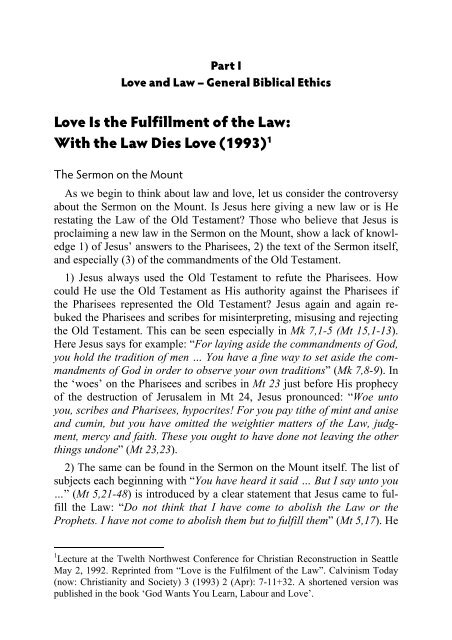Love is the Fulfillment of Law - World Evangelical Alliance
Love is the Fulfillment of Law - World Evangelical Alliance
Love is the Fulfillment of Law - World Evangelical Alliance
You also want an ePaper? Increase the reach of your titles
YUMPU automatically turns print PDFs into web optimized ePapers that Google loves.
Part I<br />
<strong>Love</strong> and <strong>Law</strong> – General Biblical Ethics<br />
<strong>Love</strong> Is <strong>the</strong> <strong>Fulfillment</strong> <strong>of</strong> <strong>the</strong> <strong>Law</strong>:<br />
With <strong>the</strong> <strong>Law</strong> Dies <strong>Love</strong> (1993) 1<br />
The Sermon on <strong>the</strong> Mount<br />
As we begin to think about law and love, let us consider <strong>the</strong> controversy<br />
about <strong>the</strong> Sermon on <strong>the</strong> Mount. Is Jesus here giving a new law or <strong>is</strong> He<br />
restating <strong>the</strong> <strong>Law</strong> <strong>of</strong> <strong>the</strong> Old Testament? Those who believe that Jesus <strong>is</strong><br />
proclaiming a new law in <strong>the</strong> Sermon on <strong>the</strong> Mount, show a lack <strong>of</strong> knowledge<br />
1) <strong>of</strong> Jesus’ answers to <strong>the</strong> Phar<strong>is</strong>ees, 2) <strong>the</strong> text <strong>of</strong> <strong>the</strong> Sermon itself,<br />
and especially (3) <strong>of</strong> <strong>the</strong> commandments <strong>of</strong> <strong>the</strong> Old Testament.<br />
1) Jesus always used <strong>the</strong> Old Testament to refute <strong>the</strong> Phar<strong>is</strong>ees. How<br />
could He use <strong>the</strong> Old Testament as H<strong>is</strong> authority against <strong>the</strong> Phar<strong>is</strong>ees if<br />
<strong>the</strong> Phar<strong>is</strong>ees represented <strong>the</strong> Old Testament? Jesus again and again rebuked<br />
<strong>the</strong> Phar<strong>is</strong>ees and scribes for m<strong>is</strong>interpreting, m<strong>is</strong>using and rejecting<br />
<strong>the</strong> Old Testament. Th<strong>is</strong> can be seen especially in Mk 7,1-5 (Mt 15,1-13).<br />
Here Jesus says for example: “For laying aside <strong>the</strong> commandments <strong>of</strong> God,<br />
you hold <strong>the</strong> tradition <strong>of</strong> men … You have a fine way to set aside <strong>the</strong> commandments<br />
<strong>of</strong> God in order to observe your own traditions” (Mk 7,8-9). In<br />
<strong>the</strong> ‘woes’ on <strong>the</strong> Phar<strong>is</strong>ees and scribes in Mt 23 just before H<strong>is</strong> prophecy<br />
<strong>of</strong> <strong>the</strong> destruction <strong>of</strong> Jerusalem in Mt 24, Jesus pronounced: “Woe unto<br />
you, scribes and Phar<strong>is</strong>ees, hypocrites! For you pay ti<strong>the</strong> <strong>of</strong> mint and an<strong>is</strong>e<br />
and cumin, but you have omitted <strong>the</strong> weightier matters <strong>of</strong> <strong>the</strong> <strong>Law</strong>, judgment,<br />
mercy and faith. These you ought to have done not leaving <strong>the</strong> o<strong>the</strong>r<br />
things undone” (Mt 23,23).<br />
2) The same can be found in <strong>the</strong> Sermon on <strong>the</strong> Mount itself. The l<strong>is</strong>t <strong>of</strong><br />
subjects each beginning with “You have heard it said … But I say unto you<br />
…” (Mt 5,21-48) <strong>is</strong> introduced by a clear statement that Jesus came to fulfill<br />
<strong>the</strong> <strong>Law</strong>: “Do not think that I have come to abol<strong>is</strong>h <strong>the</strong> <strong>Law</strong> or <strong>the</strong><br />
Prophets. I have not come to abol<strong>is</strong>h <strong>the</strong>m but to fulfill <strong>the</strong>m” (Mt 5,17). He<br />
1 Lecture at <strong>the</strong> Twelth Northwest Conference for Chr<strong>is</strong>tian Reconstruction in Seattle<br />
May 2, 1992. Reprinted from “<strong>Love</strong> <strong>is</strong> <strong>the</strong> Fulfilment <strong>of</strong> <strong>the</strong> <strong>Law</strong>”. Calvin<strong>is</strong>m Today<br />
(now: Chr<strong>is</strong>tianity and Society) 3 (1993) 2 (Apr): 7-11+32. A shortened version was<br />
publ<strong>is</strong>hed in <strong>the</strong> book ‘God Wants You Learn, Labour and <strong>Love</strong>’.

















